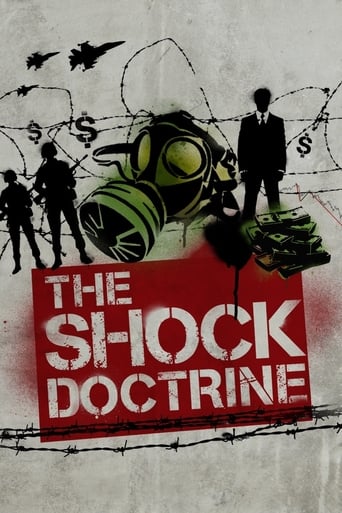miloservic
Friedman is like a leader of a cult
as to economics? that's a joke, even some senior scholars don't give a shit.
i studied economics for 6 years, at last i finally understand what economic is , it's not a science as it claimed at all, it's only a tool, a tool for brainwashers to control people's think.
sergepesic
Obviously, the opinions about this powerful documentary will be sharply divided. Liberals, and proudly I am one of them, will approve and cheer, and conservatives will call it communist propaganda and other such drivel. I lived in both communist and capitalist society. With the incredible youthful passion I fought communism and it's limits on free speech and artistic expression. And over 22 years ago I immigrated to the USA. And, it was a sobering experience. There is a freedom of speech, nobody limits the artistic expression( mostly because nobody gives a damn about art-the dying form). And there is the most troubling of all for me. The mighty dollar, the only pertinent thing. It really is all about money. Everything else takes the back seat. The extremes of socialism didn't work, because repression doesn't last forever, but, on the other hand, the extremes of ruthless, greedy capitalism, do not work either. The culture of ME,ME,ME is ultimately barren and lonely, and the impoverished will eventually rise up in arms, and who wants that. Nobody reads the dusty volumes of history books. If they were, we might be living in a different world.
imdb2-556-923983
The question on my mind after seeing The Shock Doctrine was whether ends justify means. Quite possibly, this is the question Klein wanted to be asked, because much of her case regards the distasteful means taken in order to further free market economics, tactics which the very proponents of these dogmas may feel they want to disassociate themselves with. However, my question was about Klein's/Winterbottom's own tactics.The film uses all methods that we've grown used to from modern politics: cherry-picked facts, "proofs" by emotionally-charged metaphors, hinted claims of guilt by association, sound-bite slogans that are repeated incessantly, and, of course, scare tactics. Sad to say, I've come to expect these things from political candidates that need to make their points in a 30-second TV appearance. I've even come to expect them in rating-seeking news programs. But have we stooped so low that these tactics are now par-for-the-course in documentaries, where a film-maker has 90 minutes of canvas to make a clear, compelling, and well-argued case? I happen to agree with Klein's stance that extreme capitalism is dangerous, and I think what we are seeing in both Europe and China in recent years (e.g. the collapse of Chinese nation-wide education and health policies) are just further proofs of the narrative Klein forwards. However, I don't see that there is a well-argued case here that would convince someone claiming that any change, good or bad, rarely happens in a peaceful way, or that the ultimate outcome of privatization is better than the alternative. In fact, only a handful of minutes of this film are devoted to the question of what the final outcome of extreme capitalism looks like, historically, and these minutes are full of unsubstantiated claims thrown into the air in what is exactly the tactic Klein warns against: shock a person for just over an hour, and suddenly that person becomes much more open to suggestion, at which point you can sprinkle some of your favorite dogmas on him.So, perhaps this film does a good job with all those who are willing to be convinced by visceral arguments, the likes of which have, unfortunately, come to dominate the public discourse, but I rather promote those who educate people to think. Scaring people to make the choices you think are right... well, that's what this film is all about. Isn't it?
paul2001sw-1
We're all familiar with economic shock therapy, the idea that sometimes a massive destabilisation of the economy is the first step towards recovery. What Naomi Klein argues in her book, 'The Shock Doctrine', is that chaos is not just an occasionally necessary precursor of reform, but it rather exploited or at worst engineered by reform's proponents, because the consequences of the changes proposed would not be accepted by the people if offered to them a la carte in a less pressured environment. Michael Winterbottom's film develops Klein's arguments, and presents a fairly conventional alternative history of the world. But there are still some interesting details: I didn't know that it was Eisenhower, of all people, who first warned about the military-industrial complex; and it's welcome to see a different interpretation of what happened in Chile in the 1970s to the outrageous story told by Niall Fergusson in his recent BBC series, 'A History of Money'. Yet I still felt slightly disappointed by this film, because while it exposes the lies of the new right to be friends of freedom and democracy (by showing how they need to suppress freedom to get their ideas through), it doesn't address the other part of the argument, namely, whether their economic ideas are basically sound. Perhaps it does indeed take unpopular policies to rescue broken economies; one can dispute that this belief justifies coercion, but should a rational people accept shock as a price worth paying? There are lots of good arguments that say no, but the film doesn't make them; the case that equality is an aid to the efficiency of a country, as well as a moral good in itself, is here taken for granted, although this is arguably the key point of difference between left and right. I fear that this film will not convert anyone while the right's most insidious claim, that a competitive jungle is, however distasteful, the best of all possible worlds, goes unchallenged.

